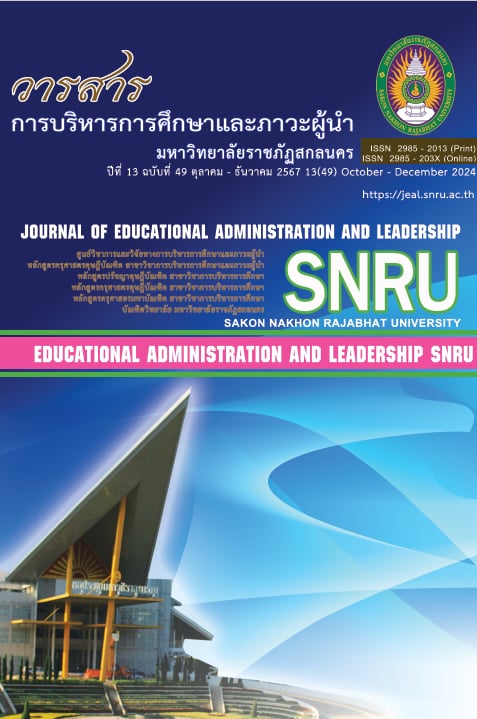

บทบาทของผู้บริหารที่ส่งผลต่อประสิทธิผลการพัฒนาคุณลักษณะผู้เรียนในโรงเรียน สังกัดสำนักงานเขตพื้นที่การศึกษาประถมศึกษาสกลนคร เขต 2
Administrators’ Roles Affecting the Effectiveness of Learner Characteristics Development in Schools Under Sakon NakhonPrimary Educational Service Area Office 2
ผู้แต่ง
ชะนัท จันทะนะ, จินดา ลาโพธิ์, ภิญโญ ทองเหลา
Author
Chanat Jantana, Jinda Lapho, Pinyo Thonglao
บทคัดย่อ
การวิจัยครั้งนี้มีวัตถุประสงค์เพื่อศึกษา เปรียบเทียบ หาความสัมพันธ์ หาค่าอำนาจพยากรณ์ และหาแนวททางพัฒนาบทบาทของผู้บริหารที่ส่งผลต่อประสิทธิผลการพัฒนาคุณลักษณะผู้เรียน ตามความคิดเห็นของผู้บริหารสถานศึกษา กับครูผู้สอน จำแนกตามสถานภาพการดำรงตำแหน่ง ขนาดของโรงเรียน และประสบการณ์ในการปฏิบัติงาน กลุ่มตัวอย่างที่ใช้ในการวิจัยในครั้งนี้ จำนวน 345 คน จำแนกเป็นผู้บริหารสถานศึกษา จำนวน 80 คน และครูผู้สอน จำนวน 265 คน การกำหนดขนาดของกลุ่มตัวอย่างใช้ตารางของเครจซี่มอร์แกน และเลือกกลุ่มตัวอย่างด้วยวิธีการสุ่มแบบหลายขั้นตอน (Multiple Random Sampling) โดยเลือกโรงเรียนทุกโรงเป็นหน่วยการสุ่ม เครื่องมือที่ใช้ในการเก็บรวบรวมข้อมูลเป็นแบบสอบถามประมาณค่า 5 ระดับ ประกอบด้วย แบบสอบถามเกี่ยวกับบทบาทของผู้บริหารมีค่าอำนาจจำแนกอยู่ระหว่าง 0.436 - 0.742 และค่าความเชื่อมั่น เท่ากับ 0.915 และประสิทธิผลการพัฒนาคุณลักษณะผู้เรียนในโรงเรียน มีค่าอำนาจจำแนกอยู่ระหว่าง 0.280 - 0.816 และค่าความเชื่อมั่น เท่ากับ 0.912 สถิติที่ใช้ในการวิเคราะห์ได้แก่ ร้อยละ ค่าเฉลี่ย ส่วนเบี่ยงมาตรฐานการทดสอบที (t – test) การวิเคราะห์ความแปรปรวนทางเดียว (One - Way ANOVA) ค่าสัมประสิทธิ์สหสัมพันธ์อย่างง่ายของเพียร์สัน (Pearson’s Product - Moment Correlation Coefficient) และการวิเคราะห์การถดถอยพหุคูณแต่ละขั้นตอน (Stepwise Multiple Regression Analysis) ผลการวิจัย พบว่า 1. บทบาทของผู้บริหาร ตามความคิดเห็นของผู้บริหารสถานศึกษา และครูผู้สอนโดยรวมอยู่ในระดับมากที่สุด 2. ประสิทธิผลการพัฒนาคุณลักษณะของผู้เรียน ตามความคิดเห็นของผู้บริหารสถานศึกษาและครูผู้สอน โดยรวม อยู่ในระดับมากที่สุด 3. บทบาทของผู้บริหาร ตามความคิดเห็นของผู้บริหารสถานศึกษา และครูผู้สอนจำแนกตามสถานภาพการดำรงตำแหน่ง และขนาดโรงเรียน มีความแตกต่างกันอย่างมีนัยสำคัญทางสถิติที่ระดับ .01 ส่วนจำแนกตามประสบการณ์ในการปฏิบัติงาน ไม่แตกต่างกัน 4. ประสิทธิผลการพัฒนาคุณลักษณะผู้เรียนในโรงเรียน สังกัดสำนักงานเขตพื้นที่การศึกษาประถมศึกษาสกลนคร เขต 2 ตามความคิดเห็นของผู้บริหารสถานศึกษา และครูผู้สอน จำแนกตามสถานภาพการดำรงตำแหน่งขนาดของโรงเรียน และประสบการณ์ในการปฏิบัติงาน โดยรวม ไม่แตกต่างกัน 5. ความสัมพันธ์ระหว่างบทบาทของผู้บริหาร กับประสิทธิผลการพัฒนาคุณลักษณะผู้เรียนในโรงเรียนสังกัดสำนักงานเขตพื้นที่การศึกษาประถมศึกษาสกลนคร เขต 2 โดยรวม มีความสัมพันธ์ทางบวกอย่างมีนัยสำคัญทางสถิติที่ระดับ .01 6. บทบาทของผู้บริหาร ที่สามารถพยากรณ์ประสิทธิผลการพัฒนาคุณลักษณะของผู้เรียนในโรงเรียนอย่างมีนัยสำคัญทางสถิติที่ระดับ .01 จำนวน 3 ด้านได้แก่ การนิเทศ กำกับ ติดตาม และประเมินผลการเรียนการสอน การกำหนดนโยบายและเป้าหมายการพัฒนาผู้เรียน และการจัดกิจกรรมนักเรียน ได้ร้อยละ 38.10 และมีความคลาดเคลื่อนมาตรฐานของการพยากรณ์ เท่ากับ ±.32095 7. การวิจัยครั้งนี้ได้เสนอแนวทางการพัฒนาบทบาทของผู้บริหาร 3 ด้าน ที่ส่งผลต่อประสิทธิผลการพัฒนาคุณลักษณะของผู้เรียนในโรงเรียนสังกัดสำนักงานเขตพื้นที่การศึกษาประถมศึกษาสกลนคร เขต 2 ได้แก่ 1) การนิเทศ กำกับ ติดตาม และประเมินผลการเรียนการสอน 2) การกำหนดนโยบายและเป้าหมายการพัฒนาผู้เรียน 3) การจัดกิจกรรมนักเรียน
Abstract
The purposes of this research were to examine, compare, identify the relationship, determine the predictive power and power and establish guidelines for developing administrators’ roles affecting the effectiveness of learner characteristics development in schools under Sakon Nakhon Primary Educational Service Area Office 2, as perceived by school administrators and teachers with different positions, school sizes, and work experience. The sample group consisted of 345 participants, including 80 school administrators and 265 teachers. The sample size was determined using the Krejcie and Morgan formula table, and multiple random sampling. The data collection tools comprised questionnaires utilizing a 5 - level rating scale. The first set focused on administrators’ roles and exhibited discriminative power values within the range of 0.436 to 0.742, and the reliability 0.915. The second set pertained to the effectiveness of learner characteristics development in schools, with the discriminative power ranging from 0.280 to 0.816, and the reliability of 0.912. The statistics for data analysis were percentage, mean, standard deviation, t – test, One - Way ANOVA, Pearson’s product - moment correlation coefficient, and Stepwise multiple regression analysis. The findings were as follows: 1. The administrators’ roles in schools, as perceived by participants, were overall at the highest level. 2. The effectiveness of learner characteristics development in schools, as perceived by participants, was overall at the highest level. 3. The administrators’ roles in schools, as perceived by participants with different positions and school sizes, show differences overall at the .01 level of significance, whereas there were no differences overall in work experience. 4. The perceived effectiveness of learner characteristics development in schools among participants with varied positions, school sizes, and work experience, showed no difference overall. 5. The relationship between administrators’ roles and the effectiveness of learner characteristics development in schools was moderately positive at the .01 level of significance. 6. The administrators’ roles, encompassing three aspects: supervision, monitoring, follow - up, and evaluation of teaching and learning; establishment of policies, and goals for learner characteristics development; and organization of student activities, could predict the effectiveness of learner characteristics development at the .01 level of significance with 38.10 percent and a standard error of estimate of ±.32095. 7. The research has also proposed guidelines for developing administrators’ roles affecting the effectiveness of learner characteristics development in schools under Sakon Nakhon Primary Educational Device Area Office 2 including three aspects: 1) Supervision, monitoring, follow - up, and evaluation of teaching and learning; 2) Establishment of policies and goals for student development; and 3) Organization of student activities.
คำสำคัญ
บทบาทของผู้บริหาร, ประสิทธิผลการพัฒนาคุณลักษณะผู้เรียนKeyword
Administrators’ Roles, Learner Characteristics DevelopmentNotice: Undefined variable: dataSet in /var/www/html/ArticleView.php on line 116
Notice: Trying to access array offset on value of type null in /var/www/html/ArticleView.php on line 116
บทความทุกบทความเป็นลิขสิทธิ์ของ
Notice: Undefined variable: dataSet in /var/www/html/ArticleView.php on line 116
Notice: Trying to access array offset on value of type null in /var/www/html/ArticleView.php on line 116
เท่านั้น
กำลังออนไลน์: 17
วันนี้: 220
เมื่อวานนี้: 2,359
จำนวนครั้งการเข้าชม: 1,157,894
อาคารบัณฑิตวิทยาลัย ชั้น 2 ตำบลธาตุเชิงชุม อำเภอเมือง จังหวัดสกลนคร 47000
โทร/
แฟกซ์ 0-4297-0093
บรรณาธิการ: รองศาสตราจารย์ ดร.ไชยา ภาวะบุตร
ติดต่อ/สอบถาม: นายธีรเวทย์ เพียรธัญญกรณ์
โทร: 0-4297-0093